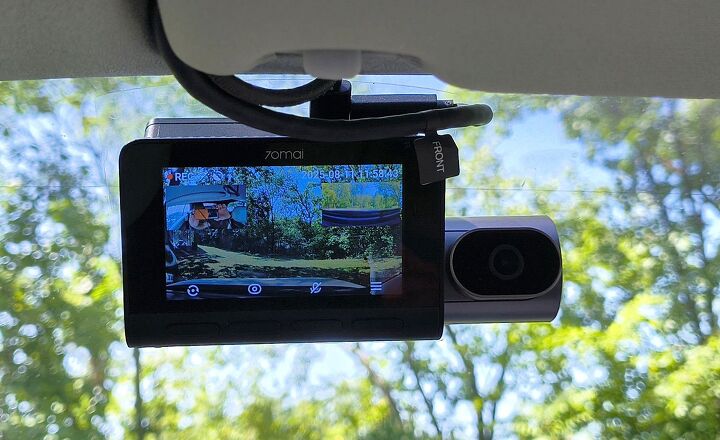70mai 4K T800 3-Channel Dash Cam Review

Less than a year after getting my driver’s license, I was involved in a relatively minor accident that left a dent in the fender of my Dodge Stratus and a deep purple streak down the side of an older Cadillac. My explanation to the officer differed from that of the significantly older and more experienced driver of the Caddy. I’ll never forget the officer’s words: “I have no reason to doubt the other driver’s explanation.” To this day, nearly 30 years later, I still believe I was wrongly ticketed for the accident.
I can’t go back in time and change what’s happened in the past. I can, however, do my utmost to avoid similar my-word-against-theirs situations that force a person who wasn’t present at the scene to decide who is being truthful and who is bending their explanation to make themselves seem less culpable. One way to make sure the truth – whether or not it falls in your favor or not – comes out on the road is to invest in a dash cam.
I own three vehicles. One is fully modern and came equipped from the factory with a full complement of cameras mounted to various exterior bits and pieces along with software to monitor what’s happening. Put simply, my own personal Tesla Model 3 doesn’t need an aftermarket dash cam. My other two vehicles, on the other hand, were built in 1993 and 2005. Neither of them have any sort of modern technology from the factory. So when presented with the opportunity to add the 70mai 4K T800 3-Channel dash cam to my arsenal of aftermarket accessories, I jumped at the opportunity.
Use the code 4KT800AG to save 5% in both the 70mai official store and on Amazon.
Installation
Installing the 70mai 4K T800 3-Channel dash cam to my 2005 Volkswagen Beetle Convertible was a relatively simple procedure. The dash cam comes with an instruction booklet, and while I’d love to tell you that its step-by-step instructions are foolproof, I can’t. It’s possible I’m just the type of fool who can’t be proofed; regardless, after a couple of failed attempts I was able to attach the front and rear cameras to the Beetle’s glass using the supplied electrostatic stickers and adhesive-backed connectors.
When it came to wiring the system, the rear camera cable is much longer than needed for my small-car application, but that wasn’t a big deal. Binding up the loose cable and tucking it under a carpet or beneath a seat is easy enough to handle.
Once everything was wired up, I was able to get the 70mai 4K T800 camera system installed and working. The installation steps are simple enough after the unit is powered on – the digital screen on the back side of the main front-facing camera unit and series of buttons work well and are easy to use – and the companion app I downloaded from the Google Play app store worked with no issues.
My 4K T800 dash cam came with a 4G-enabled Hardwire Kit that requires an active SIM card that I don’t have and isn’t available from my carrier (here in the United States, the appropriate carrier is, according to the company’s documentation, AT&T or a service that uses AT&T’s network). I can’t say for certain whether or not it’s possible to configure the Hardwire Kit to use the Google Fi network my family subscribes to; I chose to set the dash cam up without a hardwired connection. Users who choose to use the 4G Hardwire Kit will gain access to Remote Access through the 70mai App to view real-time footage (assuming you leave the cameras plugged in and active while away), receive alerts and track the vehicle remotely. There are certainly benefits available to owners who can access the appropriate mobile network, and the ability to monitor the car while away and receive collision alerts is a solid selling point for the 70mai 4K T800.
In Use
Once installed with a working cable and with my Android smartphone paired with the dash cam, the 70mai 4K T800 functioned flawlessly. While the unit does draw power even while the car is off, it offers 24/7 battery status visualization with nine levels of intelligent protection. In other words, it is designed so it won’t drain your battery to the point that you can’t start your car again.
The 70mai 4K T800 is a highly advanced dash cam setup. It records three channels of footage: forward, reverse, and in-car. The front and rear cameras record in 4K resolution and provide a crisp recording, even in low-light driving scenarios. I admit I’m not fully immersed in dash cam technology, but I can confidently say 70mai’s Sony STARVIS 2 technology provides more than enough resolution and clarity to zoom in on individual license plate numbers in all lighting conditions I was able to test it in.
70mai offers different rear camera options for the 4K T800 (RC41 or RC24). With the RC41 that I have, I am able to record in 4K at 30 frames per second (FPS). However, if you have the RC24, you can record 4K at 60 FPS on the front camera. In my opinion the 30 FPS is more than sufficient. The interior-facing camera records footage at 1080P, and while that is of course not as crisp and clear as 4K footage, it’s plenty of resolution to record a car’s comparatively compact interior space.
Fortunately, I never had to rely on the 4K T800’s Buffered Emergency Recording feature. In the event of an accident, the dash cam captures and stores footage from before, during and after the incident. The buffer length is adjustable from as little as 10 seconds before an impact to as much as three minutes, along with the exact moment of impact and 30 seconds of post-collision footage. In such a case, a separate folder on the dash cam’s memory card – our unit came with a 512-gigabyte card – called Emergency Video. This could be the exact footage you need in the case of an accident where stories from those involved don’t match up.
Should you buy the 70mai 4K T800 dash cam?
For an older car that doesn’t have cameras, sensors or even an infotainment screen, the 70mai 4K T800 may be a perfect fit. It’s a high-tech device with three cameras – front, back and interior – that records in high definition and can even respond to voice commands. It works quite well, and it’s surprisingly easy to set up and use once you get all the cables sorted considering how much tech is packed into the kit. As an added bonus, a button on the main dash cam unit cycles through camera angles, which makes it possible to use the rear-mounted lens and windshield-mounted display as a backup camera.
Assuming you agree that the most important piece of the dash cam experience is its ability to capture clear, clean footage, the 70mai 4K T800 is an excellent choice. If tech like this had existed back in my teen years, I may have been vindicated from blame for an admittedly minor incident for which I was faulted.
While I’m quite happy I have yet to have reason to call up footage from the 70mai 4K T800’s memory card, knowing it’s there if needed adds an extra layer of comfort when pulling out of the driveway.

Growing up in a family obsessed with performance and as the son of an automotive engineer, Jeremy Korzeniewski has spent his entire life as a car enthusiast. Also an avid motorcyclist, Jeremy has spent the last two decades writing about the transportation industry and providing insights to many of the largest automotive publications in the world.
More by Jeremy Korzeniewski



































Comments
Join the conversation
“I have no reason to doubt the other driver’s explanation.” Same exact words were said to me when I was new to driving and was involved in an incident that was 100% not my fault...I fought it and won in court but his words I will never forget...